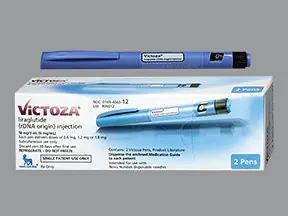Victoza Disease Interactions
There are 5 disease interactions with Victoza (liraglutide).
GLP-1 receptor agonists (applies to Victoza) pancreatitis
Major Potential Hazard, Moderate plausibility.
The use of GLP-1 receptor agonists has been associated with rare reports of acute pancreatitis. Other antidiabetic therapies should be considered in patients with a previous history of pancreatitis, although it is not known if they are at increased risk. Patients receiving treatment with GLP-1 receptor agonists should be observed carefully for signs and symptoms of pancreatitis. If this diagnosis is suspected, the treatment should be discontinued immediately and appropriate management should be initiated. Treatment with GLP-1 receptor agonists should be permanently discontinued if pancreatitis is confirmed.
GLP-1 receptor agonists (applies to Victoza) thyroid carcinoma
Major Potential Hazard, Moderate plausibility. Applicable conditions: Multiple Endocrine Neoplasia Type II
GLP-1 receptor agonist antidiabetic drugs are contraindicated in patients with a personal or family history of medullary thyroid carcinoma and in patients with Multiple Endocrine Neoplasia syndrome type 2 (MEN2). Carcinogenicity studies in rodents and limited postmarketing data suggest that GLP-1 inhibitors may cause a dose-related and treatment duration-related increase in risk of thyroid C-cell tumors, although a causal relationship has not been established.
Liraglutide (applies to Victoza) depression
Major Potential Hazard, Moderate plausibility.
Therapy with liraglutide should be administered cautiously in patients with depression or any mood or behavior disorder because of the potential for suicidal thoughts or behavior. The drug should be avoided in patients with a history of suicidal attempts or active suicidal ideation.
GLP-1 receptor agonists (applies to Victoza) renal dysfunction
Moderate Potential Hazard, Moderate plausibility.
There have been reports of acute renal failure and worsening of chronic renal failure sometimes requiring hemodialysis in patients treated with GLP-1 receptor inhibitors. Some of these events occurred in patients without known underlying renal disease. These drugs should be used with caution in patients with renal impairment, especially during treatment initiation or dose escalation. Patients should be monitored, especially if they report severe gastrointestinal reactions such as nausea, vomiting, diarrhea, or dehydration. The frequency of gastrointestinal events is increased as renal function declines. There is limited clinical experience with most of these drugs in patients with severe renal impairment.
Liraglutide (applies to Victoza) cardiovascular disease
Moderate Potential Hazard, Moderate plausibility. Applicable conditions: History - Cerebrovascular Disease
Liraglutide can increase the resting heart rate and it should be used with caution in patients with history of cardiovascular disease and cerebrovascular disease. Heart rate should be monitored regularly, and patients should inform their healthcare providers of any symptoms such as palpitations and racing heartbeat appear while at rest.
Switch to professional interaction data
Victoza drug interactions
There are 276 drug interactions with Victoza (liraglutide).
Victoza alcohol/food interactions
There are 2 alcohol/food interactions with Victoza (liraglutide).
More about Victoza (liraglutide)
- Victoza consumer information
- Check interactions
- Compare alternatives
- Pricing & coupons
- Reviews (767)
- Drug images
- Latest FDA alerts (4)
- Side effects
- Dosage information
- Patient tips
- During pregnancy
- Generic availability
- Support group
- FDA approval history
- Drug class: GLP-1 receptor agonists
- Breastfeeding
- En español
Related treatment guides
Drug Interaction Classification
| Highly clinically significant. Avoid combinations; the risk of the interaction outweighs the benefit. | |
| Moderately clinically significant. Usually avoid combinations; use it only under special circumstances. | |
| Minimally clinically significant. Minimize risk; assess risk and consider an alternative drug, take steps to circumvent the interaction risk and/or institute a monitoring plan. | |
| No interaction information available. |
See also:
Further information
Always consult your healthcare provider to ensure the information displayed on this page applies to your personal circumstances.


